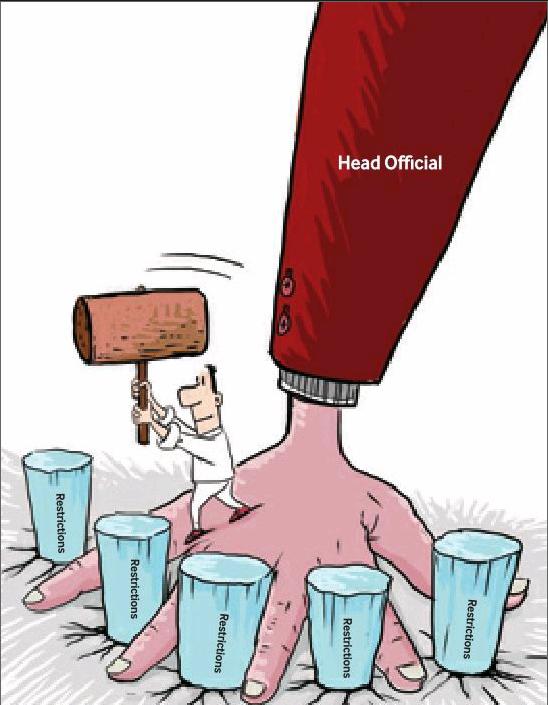Decentralizing Power
2014-06-17ByYinPumin
By+Yin+Pumin

Chinas anti-graft authority announced on May 8 that Liao Shaohua, former Standing Committee member of the Guizhou Provincial Committee of the Communist Party of China (CPC) and Party chief of Zunyi in Guizhou, has been expelled from the Party and dismissed from public office.
Investigations found that Liao used his positions for personal gains and accepted bribes, according to a statement from the CPC Central Commission for Discipline Inspection (CCDI).
Liao abused his power and was responsible for the loss of state property, the statement revealed. He also violated Party regulations and is suspected of breaking the law. Liaos case has been handed over to prosecutors.
The CCDI announced in last October that Liao was being investigated for graft. He was removed from his posts days later.
Anti-corruption experts say that the case of Liao reflects the reality that a lot of power is concentrated in the hands of local leading officials.
“As leading officials tend to monopolize resources, personnel management and construction projects, it is easy for them to become corrupt as there is little supervision from those beneath them,” said Fu Siming, a professor at the Party School of the CPC Central Committee.
Fortunately, the Chinese leadership has recognized the serious situation and determined to tighten restrictions on, and supervision of, the exercise of power by leading officials.
Responsibilities and the scope of power of leading officials of Party and government departments will be specified, according to a decision on deepening Chinas reform that was adopted at the Third Plenary Session of the 18th CPC Central Committee last November.
Unbridled power
Last September, worldwide attention was focused on a trial for Bo Xilai, former Party Chief of southwest Chinas Chongqing Municipality and a former member of the CPC Central Committee Political Bureau. Bo was sentenced to life imprisonment by the Jinan Intermediate Peoples Court in east Chinas Shandong Province on September 22, 2013 on charges of bribery, embezzlement and abuse of power.
According to the verdict given by the court, Bo was found guilty of taking bribes totaling 20.44 million yuan ($3.28 million), either personally or through his family members, between 1999 and 2012. Bo experienced a number of promotions and steps up the career ladder during this period, transitioning from the mayor of Dalian in northeast Chinas Liaoning Province, to secretary of the CPC Dalian Committee. He later became the governor of Liaoning and then minister of commerce before eventually becoming the Party chief of Chongqing, the position he held at the time of his arrest.
Bo helped those who gave him bribes obtain preferential quotas necessary to import cars and work on petrochemical projects.
The verdict also revealed that Bo, while serving as Dalians Party chief in 2000, assigned Wang Zhenggang, then Director of the Dalian Bureau of Urban and Rural Planning and Land, to take charge of a project to be built by Dalian for a higher authority.
Funds from the Dalian government were originally used for the projects and in March 2002, after the project was completed, the higher authority allocated 5 million yuan($802,500) of reimbursement. Wang proposed that Bo distribute the money among his family. Bo consented and asked Wang to talk to his wife, Bogu Kailai, to make arrangements. The 5 million yuan was eventually transferred to an account designated by Bogu.
“Local Party Chiefs have enjoyed an amazingly high level of power for many years,” said Yan Jirong, a professor at Peking Universitys School of Government. “But if they make mistakes or bad decisions, nobody at a local level is able to correct their mistakes.”
According to the CCDI, more than one third of officials at or above the county level who were dismissed in recent years due to involvement in corruption scandals were heads of government departments or Party organs.
In a decision adopted at the Third Plenary Session of the 18th CPC Central Committee, it was emphasized that law enforcement departments and audit authorities supervisory functions should be enhanced to ensure power is exerted transparently and in accordance with the law.
The CCDI expounded in a statement released last December that the audit supervision mainly targets how leading officials implement various economic decisions and policies. It should also uncover officials power abuse during major construction projects and when public funds are involved, the statement said.
The decision also outlined reforms of the Partys discipline inspection system, changes that anti-corruption experts believe will help restrict power more effectively.
According to the document, the CPC Central Committee will appoint discipline inspectors directly to local discipline inspection commissions. In addition, major inspectors will be selected by a higher-level commission that will lead investigations into allegations of cor-rupt conduct involving local officials.
“In the past, investigations into allegations of corruption were often impeded by local authorities. They were able to interfere because a disciplinary inspection commission had to work under the leadership of the local Party committee at the same level. However, after the reforms, the commission will be able to reject intervention by the local Party committee and local government,” said Ma Qingyu, a professor at the Chinese Academy of Governance.
The CCDI also attaches great importance to public and online supervision and requires officials to create more channels for whistleblowers and not to abuse their power to take revenge on anybody who reports them.
The Internet is an important platform for supervising and uncovering corrupt officials, the CCDI said, also pledging to conduct fast investigations into corruption cases reported online.
Local experiments
To effectively restrain leading officials power, the CCDI suggests forming a mutual-supervision system within the leadership.
The head officials of Party and government departments at various levels should be given fixed work, power and responsibilities, the CCDI said in its statement in December 2013. “They should have limited power in intervening in other affairs and promoting subordinate officials.”
So far, several provincial-level regions, including Shanxi, Guangdong, Liaoning, Anhui, Zhejiang, Yunnan and Chongqing, have launched pilot programs that restrict the power of their head officials, forbidding them from controlling financial resources or promotions of personnel.
Under the program, heads of local Party and government departments are restricted from taking charge of work on personnel, finance, construction, administrative licensing and procurement with public funds, according to a report by The Beijing Times in February.
That work will be assigned to officials who hold deputy positions in the department and the decision will no longer be made by one but a group of officials to help prevent corruption, the report said.
In Panan County of east Chinas Zhejiang Province, where the pilot program was first carried out in 2003, media reports have shown a remarkable reduction in the number of head officials of Party and government departments falling captive to corruption, according to a report by Xinhua News Agency.
The CCDI praised the practice. “The program aims to improve collective leadership and democratic decision making, as well as push for clean governance,” it said in a statement released in early February.
However, Hu Xingdou, a political science professor at the Beijing Institute of Technology, warned that restrictions alone might not be enough to curb the problem.
“Limiting the power of head officials is becoming a trend, but if the power structure is not open and transparent, any official may become involved in corruption,” Hu said.
Hus opinion was supported by Zhu Lijia, a professor at the Chinese Academy of Governance in Beijing.
Zhu suggests broadcasting the entire procedure of how a government position is filled on television to ensure public supervision. He also calls for similar media exposure for bidding on government projects, such as the construction of highways or bridges.
According to the professor, it is of vital importance to institutionalize the supervisory role of legislatures and CPC congresses at various levels, which have the power to elect and appoint officials.
Peking Universitys Yan said that as the current rules for restricting leading officials power only act at a local and individual level, efforts should be made to establish clearly defined regulations for this purpose in future reforms and to apply them nationwide.
